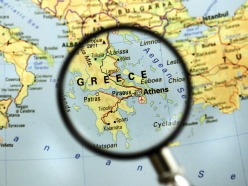
The Eurozone crisis continues to be an albatross around the neck of the world desperately hoping for some semblance of economic recovery.
The Greek default, at the heart of the Euroland debt debacle, is inevitable; the market’s already priced that in knowing full well it’s not a matter of if, but which type of, default will be allowed to happen, said London-based Christophe Caspar, chief investment officer, multi-strategy, Russell Investments.
The question is whether it will be an orderly default or a messy default. An orderly default, he said, is one where there’s an agreement between banks and creditors upfront about who loses what and involves ring-fencing of the financial system.
An orderly default thwarts any chances of contagion by setting conditions in advance and putting debt restructuring in place. The European Financial Stability Facility (EFSF), whose mandate is to safeguard the financial stability in the Euro zone by raising funds in capital markets to finance loans for euro area member states, plans to “collaterize any Greek debts” on any other European debt.
“If that happens, we’ll have an orderly default [resulting in] economic slowdown, which is happening anyway in Europe and the market will take that well,” says Casper.
Trouble is, Eurozone comprises 17 countries, and it is difficult to convince all governments involved to ratify bailout packages, he added.
“The risk [here] is that the markets will lose patience to some extent and panic,” he added saying “Greece is only 3% of the GDP of Europe, so [a Greek default] won’t be the end of the world but what happens if the contagion spreads to [bigger economies like] Ireland, Portugal, Spain and Italy.”
Countries like Spain and Italy are much bigger economies and a bailout package of € 440 million won’t be nearly enough. Casper says “you need € 2 trillion” for economies of their size. The Italian default, he said, was the biggest systemic risk to the global economy.
What’s worse is that “the European governments are not extremely committed to avoiding that” and the “democratic process needed just takes time.”
But should a messy default, though not likely at this stage, becomes inevitable, “it will get very bad.”
Could it lead to Greece becoming a Eurozone drop-out? “Greece dropping out of the Eurozone is not impossible, but getting out of the Eurozone means getting out of the Euro, a necessary condition, [but] how do you [go] from one day [printing the Euros] to another printing the drachmas,” said Casper adding the move will cost the country 25% to 50% of its GDP in just one day. “It’s an extremely complicated scenario where Greece [exits the Eurozone].”
All things considered, the likelihood of Greece coming out of the Euro is quite remote, but Casper does see the country being plagued by “haircuts, belt tightening and fiscal rigours for years to come.”
There will be more clarity around how the orderly default will be negotiated by December when Greece’s due to pay the next tranche of its debt. Casper doubts if Greece will be able to do so. “Greece doesn’t raise enough taxes and enough revenues to [be able to] pay its debt,” he said. “Only 5% of people in Greece pay taxes; it’s a major challenge for you to put your house in order when you have 120% debt, [pay] 4.8% interest rate on your debt and you have a GDP that was down 4% this year and is likely to be down next year.”
Greece default is now a fait accompli. “I don’t see how Greece can repay its debt given that it’s [caught in a downward] spiral from a gross point of view.”
“The good news about the European crisis,” he said, “is that we saw it coming, unlike [the collapse of] the Lehman Brothers; the bad news is that it’s not one country we’re dealing with but a group of countries.”